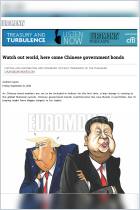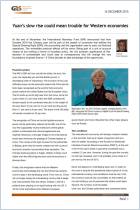Join getAbstract to access the summary!

Join getAbstract to access the summary!
Eswar Prasad
A Middle Ground
The Renminbi Is Rising, but Will Not Rule
Finance & Development Magazine, 2017
What's inside?
The renminbi is not ready to take its place as a reserve currency, despite China’s economic stature.
Recommendation
In October 2016, the International Monetary Fund formally designated China’s renminbi as one of the world’s reserve currencies, reflecting China’s standing in the global economy. But Professor Eswar Prasad argues in this well-reasoned analysis that, while the renminbi is gaining significant clout, it is far from becoming a preferred currency in global foreign reserves. Prasad examines a range of issues, including Chinese governance, to explain this dichotomy between economic power and currency status. getAbstract recommends this authoritative report to executives and policy officials interested in the future of the renminbi.
Summary
About the Author
Eswar Prasad is a professor at Cornell University and senior fellow at the Brookings Institution.























Comment on this summary